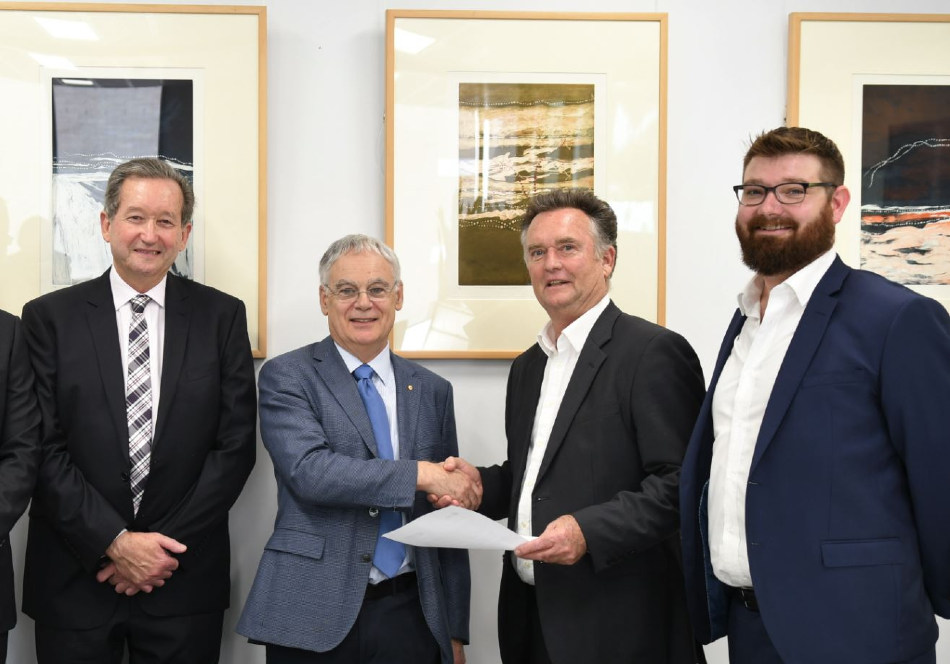Feb 19 2020
New Australian technology that could fix some of the world’s biggest environmental cleanup problems — oil spills, mercury pollution and fertiliser runoff — will soon be available to global markets following the signing of a landmark partnership in Adelaide.

The collaboration, between new generation environmental technology company Clean Earth Technologies (CET - www.cleanearth.tech) and Flinders University, will support ongoing development of the absorbent polysulfide “clean-up” agent invented by award-winning South Australian scientist Associate Professor Justin Chalker.
CET Executives will be visiting Adelaide tomorrow (Tuesday 18/2/20) to formalise the agreement which assigns a suite of patents to the Singapore-based company. CET will commercialise the new polysulfide material for global markets, with plans to set up the first manufacturing facility in South Australia.
The patents cover numerous areas, including a class of novel polymers used for environmental remediation, and a new mercury- and cyanide-free method of precious metal extraction and recovery.
The agreement also includes a research collaboration that will provide ongoing funding for Associate Professor Chalker and his team, including scholarships and salaries for researchers, and royalties as they continue to find new ways to use the breakthrough product.
Flinders University Deputy Vice-Chancellor (Research) Professor Robert Saint congratulated Associate Professor Chalker and his team for making big inroads into solving real-world problems via the commercialisation of the new green polymer technology.
“World-class research at Flinders University addresses challenges of local, national and global significance to deliver outcomes that improve lives,” Professor Saint said. “I can think of no better example than the work of the Chalker Laboratory in turning their outstanding research into new resources that can be used to deliver a cleaner world.”
CET Chairman and Co-Founder Paul Hanna said the partnership was an important step forward in the company’s search for an answer to some of the world’s most pressing environmental waste problems.
“We are heavily focused on some of the biggest and most challenging environmental problems in the world today — devastating oil spills, growing piles of e-waste and toxic mercury pollution.
“Most countries are grappling with the same big issues and they come at a huge financial, social and environmental cost,” Mr Hanna said.
“We are looking for smarter, more effective solutions and our partnership with Flinders University, and the Chalker Research Lab, will go a long way to addressing many of these problems.
“Technology like this, that uses waste to solve waste problems, has huge advantages for industry at the big end of town. It can also save the lives of thousands of small, artisanal miners around the world who use poisonous chemicals, like mercury, to survive and the communities around them.”
The new solutions complement CET’s existing cyanide and mercury-free gold processing technology.
What is the polysulfide product?
The polysulfide is a polymer that absorbs pollutants and is made from two low-cost ingredients – sulfur, a waste by-product of the petroleum industry which is currently stockpiled in massive volumes around the world, and plant oil, such as Canola. It can even be made from waste cooking oil.
How are the polymers used?
The Chalker research team is experimenting with a range of polysulfides for different uses. The material has already proven to be effective in managing agricultural fertiliser release, capturing mercury pollution in its various forms, and absorbing oil spills. For example:
- Mercury - a toxic neuro-poison, is a problem by-product for industries like oil and gas, coal-fired power plants, mineral processes, and agriculture. As well as being a health threat, it is banned in many countries, mercury can cause brittle pipes increasing maintenance costs and safety risks.
The Chalker Research Lab’s latest academic paper unveils a new class of sulfur polymers that are eight times faster at capturing mercury in water than previous polysulfides, and significantly improved over elemental sulfur alone, which is commonly used in mercury spill kits. The paper can be found online here: https://doi.org/10.1002/adsu.201900111 The research found that all of the polysulfides studied were exceptionally effective at trapping various forms of mercury, including a mercury-based fungicide that can pollute water, and is often used on sugarcane, potatoes and rice. The patent for these polymers is now owned by CET.
- Oil and gas – variations of the new polysulfide efficiently soak up spills – from removing oil slicks on the surface of oceans and waterways, to domestic garages and driveways.
- Fertiliser - The polysulfide can be mixed with nutrients, forming a fertiliser-composite that helps slow/control the release of nitrogen, phosphorus, and potassium (NPK) nutrients. This optimises crop feeding and limits damaging runoff into the environment. It differs from many commercial slow-release fertilisers, because it does not leave behind microplastic residue.
- E-Waste - While not a polymer, the second patent assigned to CET investigates a variety of benign methods for recycling and managing e-waste.